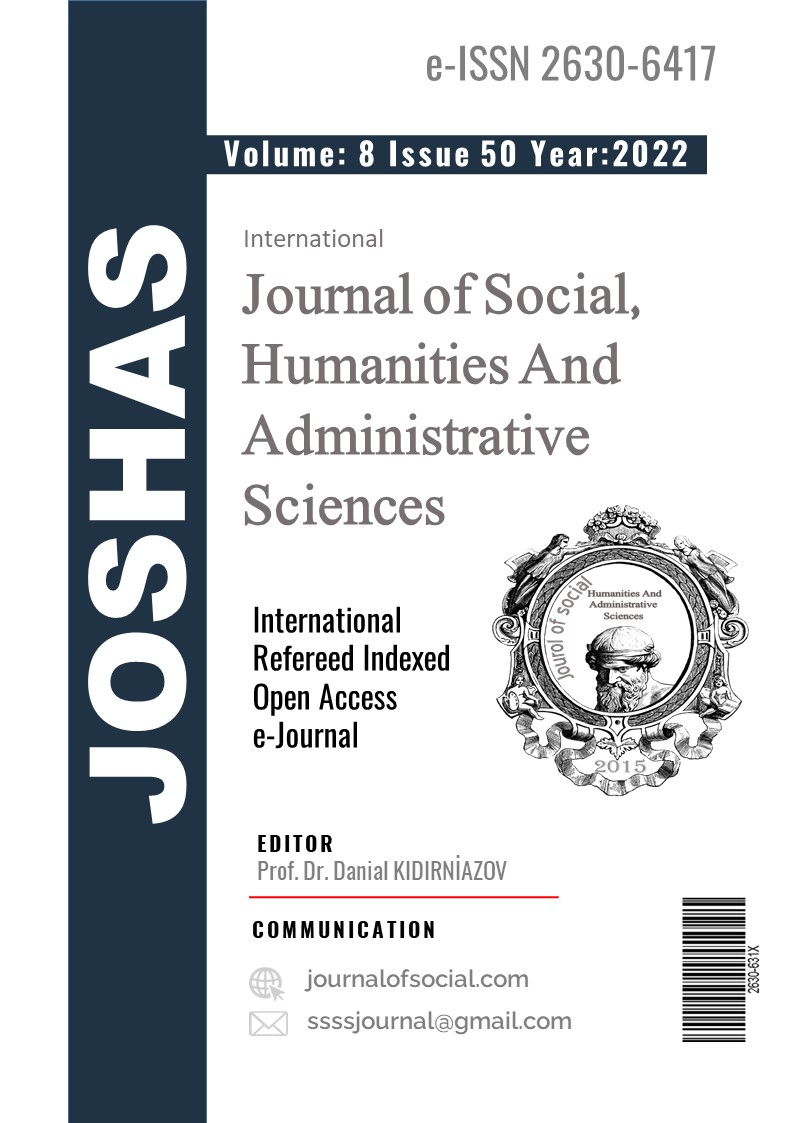Author :
Abstract
Salgın hastalıklar, insanlık tarihinden bugüne var olmuş ve toplumun her alanını büyük ölçüde etkilemiştir. İnsanların yaşam biçimlerinden, düşünce yapılarına, savaşlardan, dini inanışlara kadar birçok alanda etkisini gösteren salgın hastalıklar, toplum ve bireyler için önemli bir gerçekliktir. Salgın hastalıklar, insanların geçmişten bugüne yaşamını devam ettirmek, yeni keşifler yapmak ya da aç gözlülükle doğadan daha fazlasını almak için doğayla mücadelesinden ortaya çıkan bir olgudur. İnsanlar bir yandan istekleri uğruna doğayla çatışırken bir yandan istemedikle bir gerçeklikle tanışmıştır. Doğa her defasında farklı bir alanını kullanarak insanların içinden çıkamayacağı, başlangıcını ve çözümünü bulamadığı virüslerle saldırmıştır. Tarih her defasında tekerrür etmiş, insanlık maddi ve manevi her alanda kayıplar vermiştir. Her kötü durumun yaşattığı güzel tecrübeler gibi salgın hastalıklarında insanlara toplum olmayı, bir olmayı, doğa karşısında eşit olmayı, milliyetçiliği ve halk sağlığını öğretmiş oldu. Bu makale ile amaçlanan, günümüzde de etkisini gösteren salgın hastalığın geçmişteki süreçlerini, yaşanan durumları ve alınan önlemleri incelemektir. Bu kapsamda geçmişte etkisini gösteren sıtma, cüzam, kara ölüm (veba), çiçek hastalığı ve frengidir gibi salgın hastalıklar sosyolojik bakış açısıyla incelenmiş ve toplumsal etkileri ele alınmıştır.
Keywords
Abstract
Epidemics have existed since the history of humanity and have greatly affected every aspect of society. Epidemic diseases, which have an impact on many areas from people's lifestyles to their mentality, from wars to religious beliefs, are an important reality for society and individuals. Epidemics are a phenomenon that arises from people's struggle with nature to survive from past to present, to make new discoveries or to get more from nature with greed. While people are in conflict with nature for the sake of their wishes, they have met a reality unwillingly. Each time, by using a different area, nature attacked with viruses that people could not get out of and could not find the beginning and solution of. History has repeated itself every time, and humanity has suffered losses in all material and spiritual fields. Like the good experiences of every bad situation, he taught people to be a society, to be one, to be equal before nature, nationalism and public health in epidemics. The aim of this article is to examine the past processes of the epidemic, which is still effective today, the situations experienced and the measures taken. In this context, epidemic diseases such as malaria, leprosy, black death (plague), smallpox and syphilis, which had their effects in the past, were examined from a sociological perspective and their social effects were discussed.
Keywords
- Ağca, F.(2021). ““Stayıng At Home”: A Rhythmanalysıs Of Self-Quarantıne” (Ed. Veysel Bozkurt, Glenn Dawes,
- Ağca, F.(2021). ““Stayıng At Home”: A Rhythmanalysıs Of Self-Quarantıne” (Ed. Veysel Bozkurt, Glenn Dawes,Hakan Gülerce, Patricia Westenbroek), The Socıetal Impacts of COVID-19 : A Transnatıonal Perspectıve, ss.45-63, Istanbul Iniversity, İstanbul.
- Ahmadı, A., Şirin, H., Ergüder, T.(2020). “Dünyada Salgın Tarihçisi”, Türkiye Sağlık Okuryazarlığı Dergisi, 1(2): 87-97.
- Akdur, R.(2006). “Sıtma ve Sıtma Salgınları Tarihi”, Bilim Tarihi Araştırmaları, Sayı: 2: 1-11.
- Atasoy, F.(2020). “Bir Virüsün Yol Açtığı Yeni Bunalım Döneminin Sosyolojik Yansımaları”. Türk Yurdu Dergisi, Sayı: 393.
- Aysan, A., Balcı, E., Karagöl, E. vd.(2020). Covid-19 Pandemi Değerlendirme Raporu, Türkiye Bilimler Akademisi Yayınları, Ankara.
- Bozkurt, C.(2020). “Osmanlı’dan Cumhuriyet’e Atranos’ta Frengi ve Frengiyle Mücadele”, Türk Dünyası Araştırmaları, 126(248): 65-76.
- Bozkurt, V., Sayın, Ö. (2021). “Socıology of Coronavırus Conspıracıes in Turkey: Who Belıeves and Why?” (Ed.Veysel Bozkurt, Glenn Dawes, Hakan Gülerce, Patricia Westenbroek), The Socıetal Impacts of COVID-19 : A Transnatıonal Perspectıve, ss.79-83, Istanbul Iniversity, İstanbul.
- DeSalle, R.(1999). Epidemic! The World of Infectious Disease, (Ed. DeSalle, Rob). The New Press, United States of America.
- Foege, W. (1991). “Plagues: Perceptions of Risk and Social Responses” (Ed. Arien Mack), In Time Of Plague: TheHistory And Social Consequences Of Lethal Epidemic Disease, ss.9-21, New York University, United States of America.
- Isle, M.(2001). Malarıa, The Rosen Publishing Group, New York.
- Nikiforuk, A. (1955). The Fourth Horseman: A Short History Of Plagues, Scourges And Emerging Viruses, Penguin Books, Canada.
- Ollhoff, J.(1959). Smallpox, United States of America.
- Özçelik, M., Pesen, B.(2021). “Geçmişten Günümüze Bazı Salgın Hastalıkların Toplum Üzerindeki Etkisi”, Zeitschrift für die Welt der Türken, 13(1): 227-248.
- Özdemir, H. (2005). Salgın Hastalıklardan Ölümler, AKDTYK Türk Tarih Kurumu Yayınları, Ankara.
- Özlü, A., Öztaş, D.(2020). “Yeni Corona Pandemisi (Covid-19) İle Mücadelede Geçmişten Ders Çıkartmak”, Ankara Yıldırım Beyazıt Univesity Faculty of Medicine, Sayı 2: 468-481.
- Peters, S.(1965). Epidemic! Smallpox in the New World. Benchmark Books, New York.
- Rosenberg, C. (1991). “The Definiton and Control of Disease- An Introduction” (Ed. Arien Mack), In Time OfPlague: The History And Social Consequences Of Lethal Epidemic Disease, ss.5-9, New York University, United States of America.
- Türk Dil Kurumu: https://sozluk.gov.tr/ Erişim:03.12.2021
- Türkiye Cumhuriyeti Sağlık Bakanlığı: https://saglik.gov.tr/ Erişim: 03.12.2021
- Ünlü, H., Çiçek, E.(2021). “Salgın Hastalıklardan Koruma ve Kontrol Önlemleri, COVID-19 Pandemisi ile Mücadele ve Yaşanan Güçlükler”, Hacettepe Üniversitesi Hemşirelik Fakültesi Dergisi, 8(1): 101-107.
- Walker, R.(1951). Epidemics & Plagues, Kingfisher, United States of America.
- Winters, A(1966). Syphılıs, The Rosen Publishing Goup, New York.
- Yılmaz, Ö.(2017). “1847-1848 Kolera Salgını ve Osmanlı Coğrafyasındaki Etkileri”, Avrasya İncelemeleri Dergisi, 6(1): 23-55.





